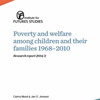among
"Unique values among workers in tech"
In a new study of political values among workers in the American tech industry researchers found a ”unique” dominance of left-liberal values and anti-establishement thinking. We asked Niels Selling, p

Poverty and welfare among children and their families 1968–2010
Research report 2014/2, 78 p. This report studies child poverty, and changes in such poverty both by analyzing the family economy, and directly by using surveys with children themselves. It also compar
Susceptibility to Moral Arguments Among Liberals and Conservatives
Public Opinion Quarterly Abstract An empirical result in Moral Foundations Theory is that liberals and progressives endorse the individualizing factors of care and fairness, while conservatives claim th
Diversity preferences among employees and ethnoracial workplace segregation
Social Science Research. doi.org/10.1016/j.ssresearch.2018.03.009 Abstract Ethno-racial workplace segregation increases already existing ethno-racial inequality. While previous research has identified d
Knowing the game: motivation and skills among policy professionals
Working Paper 2016 no.1(Published in Journal of Professions and Organization, Vol 4 (1):55-69 (2017). DOI: https://doi.org/10.1093/jpo/jow008) This paper focuses on “policy professionals”, i.e. people whinfluence the course of affairs, while their working-life satisfaction comes from getting their message into the media without becoming personally exposed. The key resource of policy professionals is context-dependent politically useful knowledge, in three main forms: “Problem formulation” involves highlighting and framing social problems and their possible solutions. “Process expertise” consists of understandingthe “where, how and why” of the political and policy-making processes. “Information access” is the skill to be very fast in finding reliable and relevant information. These motivations and skills underpin a particular professionalism based in an “entrepreneurial ethos”, which differs from both the ethos of elected politicians, and that of civil servants, and which has some potentially problematic implications for democratic governance.
Persistent boundaries. Partnership patterns among children of immigrants and natives in Sweden
Journal of Ethnic and Migration Studies Abstract Integration theories assume that ingroup partnering (endogamy) among individuals of immigrant background declines as their exposure to majority society i
Patterns of Participation: Engagement among Ethnic Minorities and the Native Population in Oslo and Stockholm
Pp. 172-197 in Laura Morales and Marco Giugni, (Eds.), Social Capital, Political Participation and Migration in Europe: Making Multicultural Democracy Work. Palgrave Macmillan. Abstract There is a widespr
The lure of power. Career paths and considerations among policy professionals in Sweden
Working paper 2019 nr 12. This paper analyses career paths and career considerations among policy professionals in Sweden. It builds on a longitudinal data set in which the professionals’ careers are m
Social Exclusion among Peers: The Role of Immigrant Status and Classroom Immigrant Density.
Journal of Youth and Adolescence. Advanced online publication. DOI: 10.1007/s10964-016-0564-5. Abstract Increasing immigration and school ethnic segregation have raised concerns about the social integrat
Resisting assimilation – ethnic boundary maintenance among Jews in Sweden
in: Distinktion: Journal of Social TheoryAbstractThis article evaluates Andreas Wimmer’s theory of ethnic boundary making by applying it to the maintenance of Jewish ethnic identification in Sweden, a








